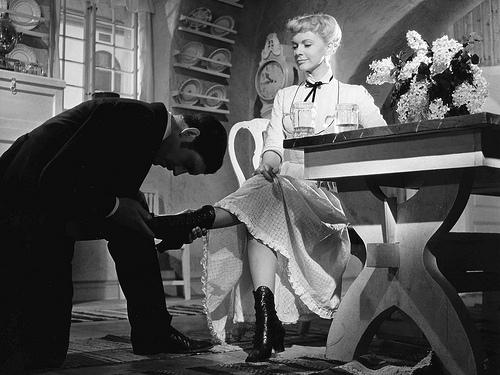In 1888, the extremely weird Swedish playwright and novelist August Strindberg, the radical lefty son of a shipping merchant and a housemaid, wrote a play called Miss Julie about the conflict between the classes, between love and lust, between obedience and servitude, and between all the possible variations on these knotty and tortu(r)ous themes. The seemingly perennial “relevance” of his story has since guaranteed endless theatrical re-runs (including productions set and/or performed in South Africa, Northern Ireland and Mississippi), a host of Miss Julie television dramas, films, a ballet, several operas – and Patrick Marber’s 1995 TV “version” After Miss Julie, subsequently transposed to the London stage.
Bettering himself with a purloined glass of burgundy (“like Mr Churchill – robust, full-bodied… and finished”), John sits down for his tea in the basement scullery of Milord’s country house, with his wife-to-be, Christine. It is the night of the Labour landslide, 26 July, 1945, and all seems as though it might finally be right with the world. Then in crashes his lordship’s wild-eyed daughter, Miss Julie – and you just know that everything’s going to shit.
Fully subtitled 'A version of August Strindberg’s Miss Julie', it would be fair to say this is more a direct modern translation
Still reeling from a broken engagement to an officer (who, not surprisingly, didn’t take kindly to being ordered about with a whip) and from too much merry-making, Julie is Exhibit A for what happens when the upstairs comes downstairs (so to speak). She blithely invades the limited privacy of the lower echelons, traps them in their already-claustrophobic environs, patronises when she intends to be nice, and wants “away with feudal anarchy” – although only so that she can have her bit of rough. Also, of course, she has the hots for John.
John (Kieran Bew) plays the game: out of his depth perhaps with this particular opponent, but he is still playing. Julie is not playing, and hers is the worst kind of flirtation: the kind that doesn’t know what it’s doing, what it wants, or when to stop. “You play with fire, Miss Julie.” “Well, luckily I’m insured.” Except, of course, that she isn’t.
She is, in fact, a fucked-up feminist disaster. By the time we find out that this daughter of a prole-hating Labour peer (classic) is also the daughter of a woman with “a thing about women’s emancipation” who was not, strictly speaking, married to His Lordship, you have to just shrug and think, “Yup – figures.”
In a twisting, turning study of power-plays both tacit and explicit, the simplest examples are those of rank (sorry) hierarchy: Julie commandeering the body of Christine’s fiancé in the absence of her own; Julie ordering John to “sit” – and John obeying. But what are these compared to John’s flat cruelty in sending Christine to bed alone (while the upstairs band play “Besame Mucho”)? Or Julie’s disgusting threat to play the rape card after – with utter inevitably – she and John have had sex?
Nobody comes out of this looking good. Julie begs to be told what to do (and to be beaten); John is a snob, who cowers whenever the bell summons him, and vaunts his self-made status as only the self-made can; Christine believes she is aloof, but her solution – apart from prayer – is merely to insist that they forget about it all and leave the (other, temporal) lord’s employ. (Of the three, Christine is clearly the least at fault; and yet she comes across – in modern terms, anyway – as offensively spinsterish, all tight lip and bunned-hair and Presbyterian church-going. Perhaps the Scottish accent of Polly Frame [pictured below right] was the tipping point, but you begin to feel that, if nothing else, John might have had rather more fun with Julie!)
 Though obviously shot through at every level with the poisonous effect of politics – even Christine’s making of John’s dinner (literally her job in the case of this household) and the mating of the local dogs seem loaded with misery and exploitation – ultimately After Miss Julie doesn’t come across as political so much as just plain tragic, in the classical sense: insecure protagonists, in complicating, unforgiving circumstances, conspiring to ruin their own lives and the lives of others.
Though obviously shot through at every level with the poisonous effect of politics – even Christine’s making of John’s dinner (literally her job in the case of this household) and the mating of the local dogs seem loaded with misery and exploitation – ultimately After Miss Julie doesn’t come across as political so much as just plain tragic, in the classical sense: insecure protagonists, in complicating, unforgiving circumstances, conspiring to ruin their own lives and the lives of others.
The Young Vic’s Maria “stage” is what theatre critics like to call “intimate” (if one of the actors, say, cuts the head off a bird, you don’t want to be in the first couple of rows), and our trio used it to the full, Natalie Dormer especially in the switch-back and demanding role of Julie. There were slaps in the face; aghast laughter. Some moments verged on the downright nasty, and the audience felt it.
If anything, I think it’s Marber’s play that comes up slightly short. Fully subtitled “A version of August Strindberg’s Miss Julie”, it would be fair to say this is more a direct modern translation (less “after” than, for instance, the Young Vic’s own remix of Dido and Aeneas a few years ago), the obvious implication being that what stood true for Strindberg in 1888, still stood (to Strindberg’s horror, no doubt) for Marber in 1995/45 – and stands now.
By the time of Marber’s version, two years before the second famous Labour landslide, the postwar triumph of the working classes must have begun to seem like a distant and very false dawn (and how much has changed, in the intervening two decades?). That said, in Marber’s setting, the updating of the master-servant relationship has, I think, been pushed about as far as it could be. Certainly, John is still taking orders; but the boss’s footwear and the ever-present "authority" of the servants' bell don’t exert the same force on the modern audience that once they might. If anything, they are just emblems of the workaday outrage of doing someone else’s chores to make ends meet.
The impact of the political message was also somewhat dented by a lame attempt on the part of the theatre to forge (sic) a tenuous link between ecology and economy, their austerity-oriented programme providing next to no information about the play or its historical background(s), and insisting on telling me how decent folks in the late Forties all made do and mended, and how I should lessen my carbon footprint by going vegetarian (no), recycling my programme (gladly!) and – I kid you not – breathing less.
Perhaps fittingly, of all the contributors, only Patrick Marber offered a worthwhile response to this: “My contribution to this eco-project is to have recycled the play.”
- After Miss Julie is at the Young Vic until 14 April















Add comment